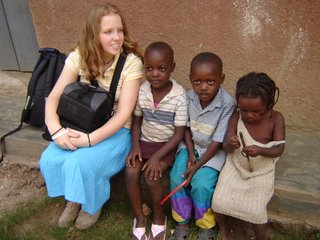
Decompression is a common experience following a plunge into another culture, particularly a society whose needs are as deep as those we meet in Uganda. You see and smell and touch and hear and taste those needs for many hours a day. Then you return to the comforts, luxuries, excesses, and trivial pursuits of our everyday life. For a short time everything back home looks different – too shiny, too loud, too sterile, too superficial. You feel judgmental about everything. We have too much. We complain too much. We want too much. We are too picky, too stingy, too uninformed or misinformed about the realities outside our suburban bubble.
But that doesn’t last long. It takes only a short time breathing the air of material prosperity before your soul adjusts to its previous state, discontent in all its comfort. I had not set foot on American soil before I was already returning to that state of soul deficiency.
For nearly two weeks I breathed the air of African poverty. The pastors with whom I studied had nothing compared to the pastors I know at home. Food, clothes, pens, paper, Bibles, education were nearly all luxuries to many of them. For a week we supplied those things before they boarded overcrowded busses to return to their villages and trading centers.
We “prayer-walked” in Kashanyarzi, where poverty and disease were palpable and stench-filled like Pasadena air. AIDS widows worked hard to scrub clothes in cold, dirty water, to prepare sparse meals over open fires, and to care for children who ran loose and naked about the assembly of one-room homes, dark like caves. A sign was scrawled over a tiny wooden structure with a padlocked door: “Birthing room. Do not urinate inside. 500 shilling fine.”
Small black children with runny noses and filthy hands followed us about the village of Omukafunda while their parents looked with empty eyes at the bazungu (white people) walking through their dusty streets, carefully stepping around the cow and goat dung on the roads. A group of women asked us to pray for them. Their men sit at a bar, unemployed and without prospect of work. What do you pray? How do you pray? What do you stand there in their presence and ask God to do for them, you who have never prayed earnestly for God to give you this day your daily bread because you already knew where it was coming from? You who have access to the best medical care in the world and who complain over rising insurance premiums – how do you ask for God to bring healing to the ravages of HIV and malaria to these who have access to practically nothing?
Then the British Air 777 lands at Heathrow and an air-conditioned bus takes me to the Holiday Inn. I begin to breathe the air to which my soul has become accustomed, and before long I have begun reentry. My room is too hot or too cold. The internet doesn’t work. My slacks are wrinkled from their two weeks in the suitcase. The buffet at the restaurant is too expensive. British food tastes bland to my Tex Mex palate. The next morning the process continues. The video screen at my seat on my flight home is “conked out” (to use the flight attendant’s technical explanation), so I am unable to watch in-flight movies. The headrest on my seat does not remain extended and is uncomfortable. By the time I land in Houston, the reversion to my culture and its ways will be nearly complete. In a few weeks of shopping at Kroger and eating out several times a week I will have forgotten the village of Omukafunda and its children. My whines will have drowned out their cries and I will be normal again.


No comments:
Post a Comment